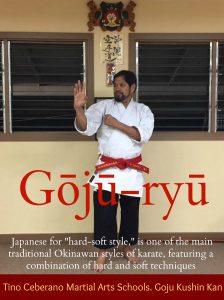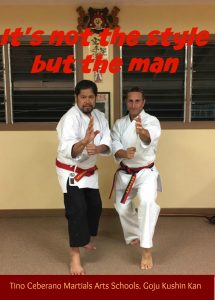 Gōjū-ryū, Japanese for “hard-soft style,” is one of the main traditional Okinawan styles of karate, featuring a combination of hard and soft techniques.
Gōjū-ryū, Japanese for “hard-soft style,” is one of the main traditional Okinawan styles of karate, featuring a combination of hard and soft techniques.
Gō, which means hard, refers to closed hand techniques or straight linear attacks; jū, which means soft, refers to open hand techniques and circular movements.
Gōjū-ryū incorporates both circular and linear movements into its curriculum, combining hard striking attacks such as kicks and close hand punches with softer open hand circular techniques for attacking, blocking, and controlling the opponent, including locks, grappling, takedowns and throws.
Major emphasis is given to breathing correctly in all of the katas but particularly in the Sanchin kata which is one of two core katas of this style. The second kata is called Tensho, meant to teach the student about the soft style of the system.
Gōjū-ryū practices methods that include body strengthening and conditioning, its basic approach to fighting (distance, stickiness, power generation, etc.), and partner drills.
At I.G.K. Headquarters Victoria, we emphasize the regular practice of basic techniques or manouevres (kihon ido), prearranged sparring or drills (yakosuku kumite) and free sparring (kumite) in a safe and respectful setting to enhance learning, personal development and confidence.
 There are many interpretations of the philosophy of karate-do and each school and style has their own, influenced by the grand-master or head instructor. Hanshi Tino Ceberano has been quoted as saying “It’s not the style but the man”.
There are many interpretations of the philosophy of karate-do and each school and style has their own, influenced by the grand-master or head instructor. Hanshi Tino Ceberano has been quoted as saying “It’s not the style but the man”.
There is no better way to describe the building of respect for others, self-discipline, desire to continue to learn and helping others, cultivate fellowship and understanding of other cultures and peoples, the personal attributes of humility, courage and a fighting spirit…all while developing strength, flexibility, coordination and technique.
The karate-do philosophy is very much about the personal qualities achieved and refined by a man or woman to improve themselves regardless of their size, strength or age, and making a committment to themselves in advancing their physical and mental wellbeing.
Sanchin kata is also called the “the three battles” of body, mind and spirit and it is these three elements we try to refine and strengthen with physical culture and a challenge to extend our boundaries and free ourselves of self-imposed limitations.
A dojo where ego is left at the door and the entire club is supportive of each member allows everyone to grow at their own rate of learning with respect, courtesy and understanding.
